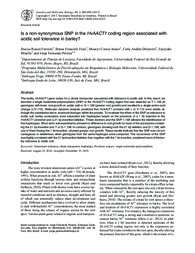Is a non-synonymous SNP in the HvAACT1 coding region associated with acidic soil tolerance in barley?
Is a non-synonymous SNP in the HvAACT1 coding region associated with acidic soil tolerance in barley?
Author(s): FERREIRA, J. R.; FARIA, B. F.; JUNIOR, M. C.; DELATORRE, C. A.; MINELLA, E.; PEREIRA, J. F.
Summary: The barley HvAACT1 gene codes for a citrate transporter associated with tolerance to acidic soil. In this report, we describe a single nucleotide polymorphism (SNP) in the HvAACT1 coding region that was detected as T-1,198 (in genotypes with lower root growth on acidic soil) or G-1,198 (greater root growth) and resulted in a single amino acid change (L/V-172). Molecular dynamic analysis predicted that HvAACT1 proteins with L or V-172 were stable, although the substitution led to structural changes within the protein. To evaluate the effect of the SNP on tolerance to acidic soil, barley accessions were separated into haplotypes based on the presence of a 1 kb insertion in the HvAACT1 promoter and a 21 bp insertion/deletion. These markers and the SNP-1,198 allowed the identification of five haplotypes. Short-term soil experiments showed no difference in root growth for most of the accessions containing the 21 bp insertion and T or G-1,198. In contrast, genotypes showing both the 21 bp deletion and G-1,198, with one of them having the 1 kb insertion, showed greater root growth. These results indicate that the SNP was not advantageous or deleterious when genotypes from the same haplotype were compared. The occurrence of the SNP was highly correlated with the 21 bp insertion/deletion that, together with the 1 kb insertion, explained most of the barley tolerance to acidic soil.
Publication year: 2017
Types of publication: Journal article
Unit: Embrapa Dairy Cattle
Keywords: Aluminium tolerance, Citrate transporter, Haplotype, Hordeum Vulgare
Observation
Some of Embrapa's publications are published as ePub files. To read them, use or download one of the following free software options to your computer or mobile device. Android: Google Play Books; IOS: iBooks; Windows and Linux: Calibre.
Access other publications
Access the Agricultural Research Database (BDPA) to consult Embrapa's full library collection and records.
Visit Embrapa Bookstore to purchase books and other publications sold by Embrapa.

